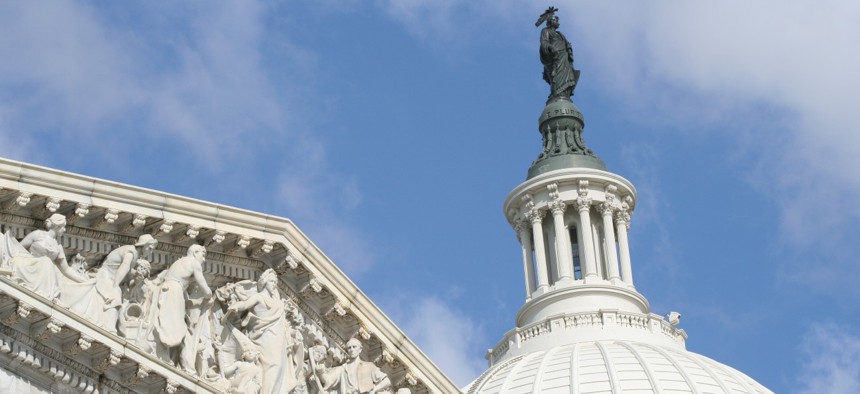
Ulrik / iStock.com
Congress Approves Borrowing Limit Increase, Punting Debt Default Furloughs to 2023
Republicans rejected the increase but paved the way for its passage.
Both the House and Senate have approved a measure to raise the nation’s borrowing limit by $2.5 trillion, staving off any potential debt default that would have catastrophic impacts on agency operations until 2023.
The threat of a debt ceiling breach has loomed since the summer, when the Treasury Department instituted “extraordinary measures” to avoid a default. Lawmakers agreed to a short-term patch in October and are now heading for a longer-term solution. Republicans unanimously rejected the measure, but allowed for it to pass with a Democrat-only majority in the Senate in a previously approved, bipartisan bill to allow for a one-time avoidance of normal filibuster rules. The measure passed 50-49 in the Senate on Tuesday afternoon and 221-209 in the House early Wednesday morning with one Republican, Rep. Adam Kinzinger, R-Ill., joining all Democrats in supporting it. The bill will now head to the President Biden for his signature.
Treasury Secretary Janet Yellen recently warned lawmakers the nation could breach its borrowing limit as soon as Wednesday, though other observers said it would likely occur later in December or January.
There is no blueprint for how the government would operate if it reached and broke through its debt ceiling, though it is clear agencies would not be able to carry out their normal operations. Because typical spending outpaces the revenue the Treasury Department brings in on a given day, the federal government would only be able to pay 60% of its bills in a given month of a default scenario, according to a Bipartisan Policy Center estimate.
Analysts and Treasury officials have sketched out two possible outcomes during a default: the government would either delay payments until it collected enough revenue to cover them, or prioritize some payments while allowing others to go unpaid. In either scenario, agency payments to beneficiaries, states, grantees, contractors and, potentially, their own employees, could be disrupted. Some federal workers could be furloughed or asked to continue working on the promise of back pay in the future.
Republicans have been dead set in forcing Democrats to pass a measure to raise or suspend the debt limit on their own, while Democrats have pushed for a bipartisan compromise. Senate Majority Leader Chuck Schumer, D-N.Y., and Senate Minority Leader Mitch McConnell, R-Ky., negotiated the compromise earlier this month that allowed Democrats to quickly increase the debt ceiling without Republican interference.
The White House said on Tuesday that President Biden will sign the bill, calling it critical to “preserve the full faith and credit of the United States” and thanking lawmakers for developing a bipartisan path to usher it through.
“Passage of this legislation will allow the Treasury to finance spending and tax cuts Congress has already authorized and to keep its commitments without causing disruption or harm to our economy and American families,” the White House said.
This story has been updated to note the bill's passage in the House.







